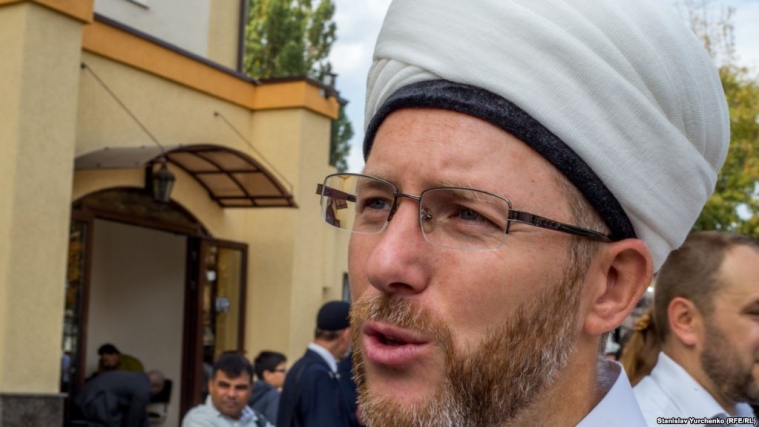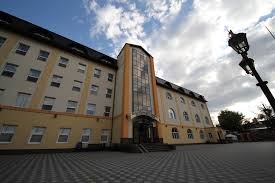Said Ismagilov, Mufti of the Spiritual Directorate of Muslims of Ukraine, has accused Ukraine’s enforcement bodies of multiple infringements during an early-morning search of the Islamic Cultural Centre in Kyiv. Ukraine is using methods, he says, which are disturbingly similar to those applied in Russian-occupied Crimea. A spokesperson for the Kyiv prosecutor’s office has rejected any criticism, asserting that the measures were in accordance with the law.
According to Said Ismagilov, there was only one security guard present when officers from the SBU [Security Service], police and prosecutor’s office appeared at 6.30 a.m. on March 6, together with their own ‘witnesses’. Such witnesses are there to ensure that all procedure is followed and the fact that the security guard was prevented from calling others to fulfil this role is already of concern.
Around 20 individuals in total blocked access to the Mosque, as well as to its courtyard, and would not let the guard make a call and ensure that other colleagues were present. Since material was allegedly ‘found’ which Said Ismagilov is adamant had not been there, this serious procedural infringement is of critical importance.
The Mufti reports that the officers produced a warrant to search for literature “which promotes hatred and cruelty, racial, ethnic or religious intolerance and discrimination”.
The Centre is large, and the officers split up into groups, making it physically impossible for the guard to see what the men were doing in each location. While he opened the library and school building, another group of officers used a crowbar to open the door to the bookshop. There, in the absence of the Centre’s staff, a lawyer of independent witnesses, they claim to have found suspect material.
According to Said Ismagilov, they also searched the flat of the person responsible for the library, Sheik Tarik Sarkhan, where they allegedly found two books hidden behind the fridge.
This is all depressingly reminiscent of searches carried out in occupied Crimea. There have, for example, been at least three armed ‘searches’under Russian occupation of the Mosque / Muslim Cultural Centre Sozidanye [Creation] in Simferopol. On the last occasion, the armed and masked men claimed to have found ‘prohibited literature’ near the outside toilet, although it was inconceivable that any devout Muslim would have left religious literature in such a location.
Said Ismagilov accuses the Ukrainian authorities of behaving in exactly the same fashion. He speaks of three searches of Mosques in mainland Ukraine thus far, first in Sumy and Zhytomyr, now in Kyiv, and says that on each occasion books were planted. After the first two searches, he pointed out to the SBU that, unlike Russia, Ukraine does not have a list of ‘prohibited literature’. What therefore were such ‘shows’ about?
He was told that there had been a court ruling, back in 2012, over a specific book published abroad, which the SBU had confiscated in the course of their criminal proceedings. The views expressed in that book (seemingly linked to the ‘Direct Path’ [«Прямой путь»] movement were not shared by either the Spiritual Directorate or by the Islamic Cultural Centre, and no copies of the book were therefore held.
The Mufti says that he was assured after the last such ‘search’ that there would be no repeat performance, but points to what has now taken place in Kyiv.
As mentioned, the prosecutor’s office and SBU assert that everything was in accordance with the law, and that up to 100 items of literature were removed.
Journalist Taras Ibragimov was told by Olena Hitlyanska from the SBU that their officers were there merely as “technical personnel”. The Kyiv prosecutor’s office confirms that the above-mentioned searches in Kyiv were carried out, as well as one in Poltava. They say that the court order was “in order to identify wrongful actions by certain individuals”. The investigator’s application for the search warrant had stated that “unidentified individuals in Kyiv are circulating books in Russia about the cult and traditions of Islamic teaching whose texts contain words promoting religious intolerance”. Two books, at least, are involved, though Hiltyanska refused to identify them.
The criminal investigation is under Article 300 § 1 of Ukraine’s Criminal Code (preparing or circulating works promoting a cult of violence and cruelty”. Two linguistic assessments have already been carried out which found that the said “brochures are aimed at promoting violence, religious intolerance and discrimination.”
Despite this investigation allegedly being because of suspected actions by individuals, nobody has been informed that they are under suspicion.
Source: KHPG




